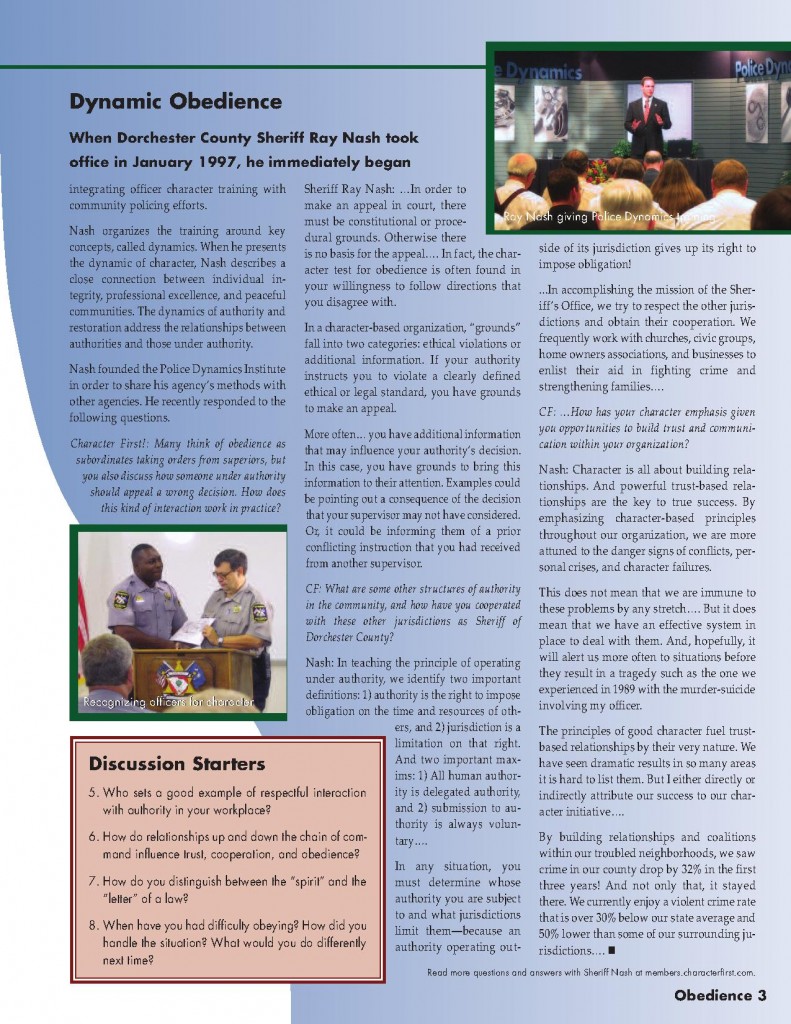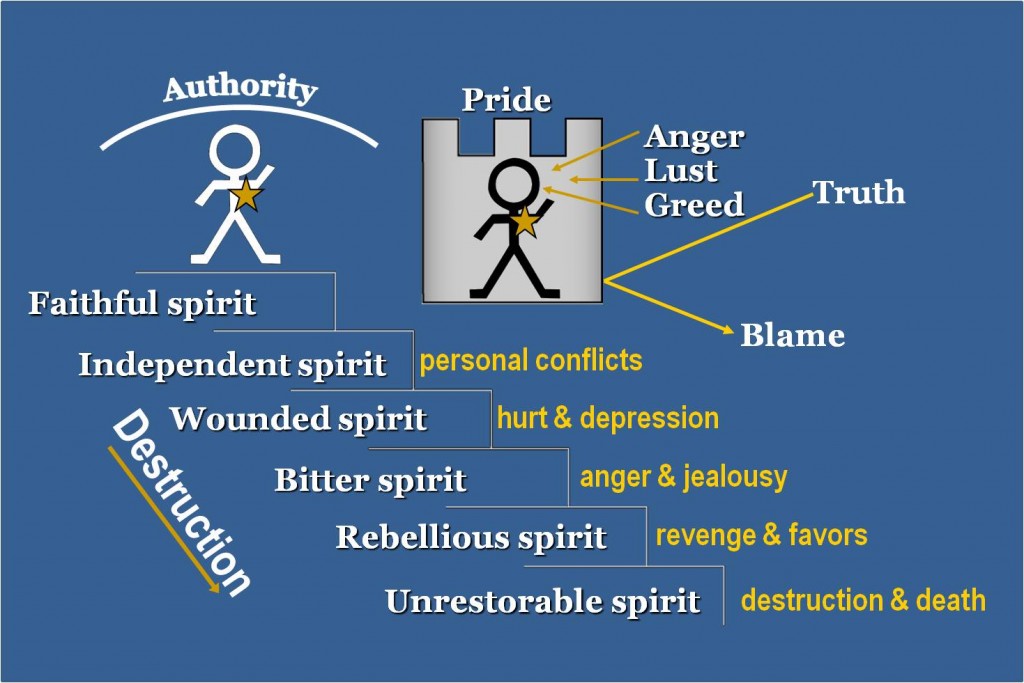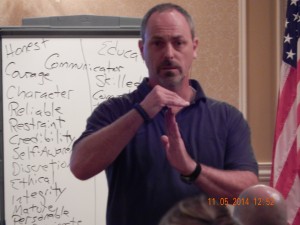Category Archives: Dynamic of Restoration
As law enforcement and public safety officials, we are often called upon to mediate conflicts.
These conflicts can be internal between officers, or external between members of the public, or a combination of the two where an officer has a conflict with a citizen. By applying the character quality of forgiveness to a conflict resolution strategy, many conflicts can be resolved effectively. When I was first exposed to this technique, I was skeptical, and even thought it was a bit hokey. But after using it several times, and NEVER having it fail, I became convinced of its power as a conflict mediation technique.
Unforgiveness results in many of the internal conflicts, relationship issues, grudges, and job-related stress that plague our law enforcement and public safety agencies. Join me for a thought experiment that shows the power of forgiveness.
FORGIVENESS
Clearing the record of wrongs and refusing to hold a grudge
Level 1 Forgiveness is hard enough. But can you make it to Level 2? Or would you rather keep drinking the “cup of bitterness?” And don’t confuse forgiveness with pardon. Let me know what you think.
In this short video recorded at a recent Police Dynamics conference hosted by the Brownsburg, IN Police Department, I emphasize that fact that failure to clearly articulate a standard is a leadership failure. Then explore the definition of the character-based standard of Obedience.
OBEDIENCE:
Quickly fulfilling the expectations of my authorities while guarding my attitude.
The first part of E5 Leadership is to Establish the Standard. Standards in the law enforcement profession tend to be performance, behavior, or achievement-based standards. But Credible Leadership requires that we establish character-based standards. The second step in E5 Leadership is to Embrace the Standard. This has to do with communicating the standard at every level. The character-based standard should be reinforced through selection, training, officer recognition, promotion, discipline, terminations, critical incident debriefings and every other aspect you can think of.
To learn more about the character quality of Obedience as it applies to a law enforcement agency, click on the pdf below…
Source: Character First, Oklahoma City, OK
Unresolved anger is one of the most prevalent problems in law enforcement today. It can lead to all sorts of ethical failures by our police, including abuse of force, unlawful arrests, and a myriad of other constitutional and ethical violations. Giving up your right to get angry is power under control and shows genuine meekness – a powerful character quality for any professional police officer to possess. And in light of recent events questioning police use of force, this video that I recorded in Cancun a few years ago seems particularly timely and relevant. Please let me know what you think.
The Wounded Spirit is the one who always gets his feelings hurt…and over some of the silliest things! In our first video in the Dynamic of Restoration series, we learned that a person out from under authority has learned to deflect the truth by assigning blame to others. So it is easy for them to develop a Wounded Spirit that can only be cured by developing the character quality of Forgiveness…
FORGIVENESS
Clearing the record of wrongs and refusing to hold a grudge
This is perhaps the most difficult character quality of all because it absolutely goes against our human nature. Yet, just like Attentiveness is the key to learning, Forgiveness is the key to restoring relationships.
The “brotherhood” of law enforcement is somewhat unique in that we are willing to lay down our lives for our fellow officers…even if we don’t like them very much! “No greater love hath a man than this, that he is willing to lay down his life for his friend…” Doesn’t this give us the basis for a relationship? Yet so many of us continue to hold grudges. But forgiveness is such a better option for everyone.
Don’t confuse forgiveness with pardon, however. Forgiveness is about restoring a relationship, not necessarily absolving someone of the consequences of their behavior.
Level 1 Forgiveness is when you are willing to forgive someone who has wronged you if they come to you in a genuine spirit of repentance and say the seven hardest words to say in the English language: “I was wrong. Will you forgive me?” Many of us would be willing to forgive the person if they came to us in that manner and we really perceived they were sincere. As hard as THAT is, Level 2 Forgiveness is much more difficult. That’s when you just make a decision to forgive the person even if they never ask…! Or would you prefer to continue to drink the cup of bitterness…? It’s up to you…
If you found this lesson helpful, please share it with others by clicking
one of the Share the Knowledge buttons below…
These two terms are often misunderstood to mean the same thing. They rhyme, but that’s about all they have in common. Meekness means power under the control of character. In Part 3 of the Dynamic of Restoration we look at Meekness as the critical character quality for restoring the Bitter Spirit.
Meekness
Yielding my personal rights and expectations with a desire to serve others
Why do we get mad? Usually it’s because we perceive that someone else has violated one of our personal rights. Whether they cut us off in traffic, steal “our” parking space, or cut in line at the grocery store, we tend to get mad because we perceive they have stepped on one of our rights. If they cut in line behind us, we don’t get mad. We think that’s funny because now they have stepped on someone else’s rights!
A meek person has learned to yield his “rights” to emotional, sensual, and material satisfaction (read that anger, lust, and greed – the three root character flaws) and be released from the accompanying anger and bitterness.
If you found this lesson helpful, please share it with others by clicking
one of the Share the Knowledge buttons below…
The Police Dynamics Basic Training Package is now available for
only $47…
By definition, the Unrestorable Spirit is just that — unrestorable. He refuses to be restored and enjoys being a Renegade. Outside of divine intervention, they are a lost cause. However, there is great hope for the other Renegade Spirits. Starting with the Rebellious Spirit, lets look at a character-based approach to restoration.
First of all, definitions are critically important. If we are going to incorporate character-based standards into our progressive discipline model, we have to be particularly careful to define and articulate the standard. Normally, we might define Obedience this way: “following the instructions of someone in authority…” But this is a behavior-based definition and it is very superficial. I like this character-based definition of Obedience better:
Quickly and cheerfully fulfilling the expectations of my authorities
Notice that “fulfilling expectations” is different than “following instructions.” It is entirely possible to be technically obedient in actions and be totally rebellious in attitude. We define character as “the internal motivation to do the right thing regardless of the circumstances and regardless of the costs.” A truly obedient person obeys in both action and attitude. And a good supervisor must have the discernment to look below the surface of behavior to determine the true attitude of the heart.
In this video, I also use a humorous example to illustrate how Problem-Oriented Policing can actually backfire on us if we do not communicate our expectations properly.
NOTE: I just returned from Romania this morning after conducting a number of Police Dynamics training sessions at the invitation of the Romanian National Police and their National Anti-Drug Agency. I hope to post some new videos and photos from there in the coming weeks…
If you found this lesson helpful, please share it with others by clicking
one of the Share the Knowledge buttons below…
And don’t forget to check out the Professional Development Resources
that are now available…
In Part 1 of the Dynamic of Restoration, we take a closer look at the downward steps in the Path of Destruction. Identifying where an officer is on this path is the key to their restoration. And one of the most important questions we can ask ourselves is “where am I on this path…”
The Dynamic of Restoration builds on the ethical foundation of the Dynamic of Authority. Once a law enforcement officer develops an Independent Spirit and steps out from under authority, there are certain predictable patterns of behavior that can begin to manifest in his life. Ultimately, these behaviors can lead to death. Independent Spirits are very good at deflecting the truth by assigning blame to others. That leaves them open to the three root character flaws – anger, lust, and greed.
The downward progression of the Path of Destruction can be seen in this Dynagram.
As you can see, it closely mirrors the Five Types of Offenders that we covered in the Dynamics of Discretion, Compliance, and Discipline.
Blaming others for your problems, rather than taking personal responsibility which is the path of character, can lead to a Wounded Spirit. This in turn can lead to a Bitter Spirit, and bitterness can destroy you. Pretty soon, the officer is no longer content to get mad. They want to get even! That’s the Rebellious Spirit. Ultimately, this can lead to an Unrestorable Spirit, who is by definition beyond restoration. In the next episode, we will look at how to restore these renegades by applying specific character-based principles.
If you found this lesson helpful, please share it with others by clicking
one of the Share the Knowledge buttons below…
And don’t forget to check out the Professional Development Resources
that are now available…
One of my former deputies wrote a research paper for his college course on ethics training. He included a section about his experiences with the Sheriff’s Office that I thought you might enjoy reading. His comments are about our philosophy regarding policies:
I had the privilege of working for a great sheriff in Dorchester County, SC. When I started working for Sheriff Ray Nash, I had just transfered from a much larger agency where everything was controlled by the policy manual and if you made a decision that a person of higher rank did not approve of, they would pour over the policy manual, which was in excess of three inches thick, to see if they could find something to punish you for “ethically.”
My Dorchester County policy manual (was so thin it) looked like a church bulletin — it was less than 20 pages long and in paperback. Sheriff Nash’s philosophy was to give his employees a few concrete moral lessons and then take those lessons out into the field and make our decisions not based on just a policy manual and the law, but on ethical principles. His belief was if you make ethically and morally correct decisions then those decisions will (also) be legally correct and will not violate policy. It is a philosophy I still carry with me today…
Richard Vaughn
I appreciate his understanding of this important topic. Policies are important and you have to have them in a high liability profession like law enforcement. But I also believe that it is impossible to write a policy for every conceivable situation an officer might find himself in. Some of us have attempted to do so and that’s why our policy manuals look like an encyclopedia volume!
I much prefer to focus on principles. Because I believe it is possible to articulate a much smaller number of ethical principles that will guide officers through a myriad of situations that they might find themselves in. That’s what Police Dynamics is — my effort to articulate these principles that govern our relationships and the profession of law enforcement.
Sheriff Ray


